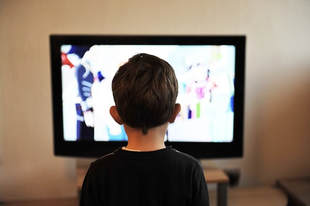|
Psychologists say that people can be driven to irrational decisions by too much complexity and uncertainty. I read that somewhere, and it has bothered me ever since. I think it bothers me because I can’t be certain what it means! Then I feel embarrassed, because I don’t want to admit that I don't understand. I do understand irrational decisions though. I know all about those. Those are the types of decisions I make when I am surrounded by kids, and they all want different things at the same time. For example: I find out that in one of “those” overwhelming moments, apparently I did agree to let my daughter paint her room -- and that she has started it because I said “yes.” She’s not impressed by my claim to temporary insanity, and that I have to have her wait. My two reasons aren't "good enough" for her. So I have to convince her to wait until......... (a) I have time to teach her how to paint, and (b) she understands that painting one wall black and one wall green is just not going to be allowed. The challenge for me is to figure out how to make decisions that are rational, based on concrete reasoning. That’s why I love principles so much. Guiding Principle: When choosing when to do something, ask yourself: Is it CRITICAL? Or is it BENEFICIAL, but not necessary now? I can say to my daughter, “I’m very interested in what you have to say about painting your room, and I’d like to discuss it with you. Right now, though, I’m feeling worried because I have dinner to prepare, and can’t concentrate on that. Would it be okay if we talked about this ___________ (and you fill in the particular time). My daughter will be much more likely to listen to my thoughts about painting if I arrange a time when that can be our sole topic, so that she can be heard and acknowledged. I will be more likely to be calm if I can not confused and uncertain about what else might be happening at the moment.
People respect that, especially if you are known for following through. It eliminates confusion, and reduces uncertainty.
0 Comments
This morning I could not find the lid to my blender. I couldn’t very well make smoothies without the lid, because the liquid would splatter all over the place. My daughter has the job of putting away dishes after they have been washed. I figured that she must have put the lid someplace, and went to ask her where it was. “On the shelf where it always goes,” she replied. I went back to the kitchen and looked again. I sure didn't see a lid. So I went back to my daughter’s room. “Will you please come and think just like you do, and show me how to find the blender lid?” She’s used to how I word things, and understood. What I meant was this: I have looked twice for the lid, in the place you told me it should be, and I don’t see it. So what I need is for someone who thinks like YOU think, to show me how to find it. Sure enough, she came, and the lid was right on the shelf where she said it would be - but it was resting on its side, and partially covered by another object. I simply hadn’t seen it. Problem solved.  Why would I take 7 paragraphs to describe this silly event in our home?  Giving from the heart means that we give freely - without worry that we won’t have our own needs fulfilled. Inspiring stories give us examples of this. One of my personal favorites is the story behind the North Platte volunteers during WWII. The women near North Platte (from over 150 towns) organized a “canteen” to serve soldiers traveling through on their way to war. Over the course of the war, they fed over 6 million soldiers. This was all done free of charge. The women made the food out of their own home supplies, and brought it to the canteen to serve. Here’s the inspiring article. Take a minute just to relax, read, and remind yourself of the power of giving from the heart. https://www.npr.org/sections/thesalt/2016/12/07/503157986/north-platte-canteen-where-the-heartland-opened-its-heart-in-wwii  Let’s face it -- sarcasm is not helpful in communication. We may think it is funny - but sarcasm tends to hurt people’s feelings. Sarcasm is really criticism. Here’s what President Gordon B. Hinckley of the Church of Jesus Christ of Latter-day Saints said about this in 1994. (Link: https://speeches.byu.edu/talks/gordon-b-hinckley_lord-helm/) There is too much fruitless, carping criticism of America. I know that for some the times are dark. There have been dark days in every nation. I would like to repeat the words of Winston Churchill spoken when bombs were dropping on London. The German juggernaut had overrun Austria, Czechoslovakia, France, Belgium, Holland, Norway, and Russia. All of Europe was in the dread grasp of tyranny, and England was to be next. In that dangerous and desperate time, when the hearts of many were failing, this great Englishman said, and I quote—and I remember hearing these words on the radio at the time: Do not let us speak of darker days; let us speak rather of sterner days. These are not dark days: these are great days—the greatest days our country has ever lived; and we must all thank God that we have been allowed, each of us according to our stations, to play a part in making these days memorable in the history of our race. [Address at Harrow School, 29 October 1941] Let’s use words that create optimism and hope. Our viewpoint matters!  I had been running errands most of the afternoon, leaving my children at home with my 16-year-old son who was supposedly “babysitting.” As I came home, just as I opened the door, I heard my 13-year-old son say, “Hide the evidence.” ……………...Not a very relaxing thought, right? I walked in, and immediately saw that evidence. The children had been watching a movie (which I had asked them not to do), and they had been eating ice cream. Eating in that room was definitely against the rule. In addition, ice cream was not on the approved list of snacks, and everyone knew it. The dog was on the couch (not allowed), and toys with multiple pieces were scattered all over the floor. Look at this article in the Deseret News newspaper, dated Wednesday, September 20, 2017.
https://www.deseretnews.com/article/865689149/Lois-Collins-Protests-should-build-and-illuminate-not-stifle-others-voices.html Lois Collins talks about the recent protests against having a conservative speaker lecture at a college campus. Many people disagree with his ideas. Yet - on the other hand - there are those who either agree with the ideas, or who want to hear more about them so they can decide for themselves. . The point made in this article is that we live in a society based on the right to free speech. The ideas this speaker has are not violent, and don’t incite violence. We need to be able to allow others to express their ideas, even when their ideas are contrary to our own.  In our communications class we talk about judgment. Many people say: “Judgment is bad. Don’t do it.” “You have no right to judge.” However, as we discuss judgment in class, we think about the fact that it is important that we DO judge -- some things. We have to be able to judge if someone is going to harm us or not. We need to judge in some way, just so that we can protect ourselves.  Most people take the Principles of Communication course and expect to improve communication in terms of how they talk with other people. They expect improved relationships, or hope to be able to work with co-workers more effectively, or hope to find a way to set boundaries with a “difficult person” in their lives. Time and time again, the feedback form tells me that the Number One thing that they gained from the course was increased positive self esteem. That’s exactly why I teach the course. One day one of my sons said to me, “I am just never going to understand math.”
He was very discouraged. He had spent a long time doing his math assignment, but only got 12 out of 25 problems right. He said, “I don’t understand math. It doesn’t make any sense to me.” I said to him, “What are you going to do?”  Words can have a powerful influence in our lives. I remember an experience when I was about 13 years old. One of the women in our local church congregation came up to me and handed me a note card. Inside, she had written a nice letter, telling how much she respected me, and how happy she was to know me. She expressed appreciation for a talent she had noticed I had, and told me she really cared about me. A friend of mine told me about her very frustrating day last week. She had volunteered to watch a neighbor’s children while the neighbor went to an appointment. She did this willingly, and wanted to help her friend.
However, the neighbor was late getting back. After the appointment, she had stopped to do some other things. She arrived home more than two hours after my friend had expected her. My friend was upset about this. She wanted to know what she should have done. I asked her if she could label her specific feelings. |




